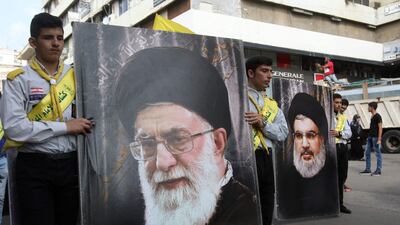Time and again, the Lebanese state has been blamed for “not doing enough” to contain Hizbollah. As for critics who realise that there is little to be done against a well-armed party backed by Iran and its allies, the advice is blunter: stop all assistance to Lebanon because it is a proxy for Iran.
This range of attitudes has been visible from both governments in the Gulf and from quarters in the United States, many with an affinity for Israel, who advocate a cut in all military aid to the Lebanese army. In a concise tweet last week, Israeli defence minister Avigdor Lieberman put this logic succinctly: “Lebanon = Hizbollah. Hizbollah = Iran. Iran = Lebanon. Iran is dangerous to the world.”
But then what are the options open to the Lebanese, or at least, the majority of Lebanese who do not embrace Hizbollah’s agenda in the region and do not approve of its imposing its regional fights on Lebanon?
The reality is that the critics have no persuasive solution. If the response is for the Lebanese army to fight Hizbollah, the outcome would be very simple: civil war, a likely split in the army, as many Shiite officers and soldiers oppose operations that would target their community, and military stalemate. Nor is it likely that the military could take such a decision, given the multi-communal nature of the officer corps, where many would simply oppose a policy that is certain to fail.
Conversely, if the recommendation is for Hizbollah’s foes to oppose the party at every turn politically, then that means effectively pushing Lebanon into a situation of political stalemate as all governance breaks down. A refusal to serve with Hizbollah in the government, or even parliament, for instance, would create policy deadlock, at a time when Lebanon is in vital need of taking political and economic measures to ameliorate its fragile finances and crumbling infrastructure.
______________
Read more
Iran nuclear deal 'not negotiable', Tehran tells France
Busy diplomat Macron gets stuck into Lebanon crisis
______________
That is why, in the absence of ready solutions, for outsiders to tell the Lebanese to “do more” with regard to Hizbollah is really just a way of confirming that Lebanon cannot do much and, therefore, that the country must expect to pay the consequences. This is where opponents of military assistance to the army are leading. Israel and its supporters are laying the groundwork for massive retaliation against Lebanon in the event of a future war between Israel and Hezbollah.
Yet Hizbollah is a genuine threat to Lebanon as a state. It’s not enough to simply say that nothing can be done against the party and leave things there. In many regards, Hizbollah is a problem far worse than the presence of the Palestine Liberation Organisation before Lebanon’s civil war in 1975. The PLO had then created a state within the state, one that clashed with the Lebanese state. The sectarian dynamics unleashed contributed to the civil conflict at the time.
A major difference is that Hizbollah, unlike the PLO, is Lebanese. When the Israelis invaded Lebanon in 1982, they could expel the Palestinian leadership from the country (a process repeated by the Syrian army, when Yasser Arafat returned to northern Lebanon in 1983). There is no such option with Hizbollah, whose infrastructure and leadership is native to and anchored in the country.
So, what options are left open to adversaries of the party, who don’t want to see Lebanon torn apart by regional conflicts? The answer will, perhaps, not satisfy those favouring more radical measures, but in a word it’s patience.
______________
Read more on Hizbollah
Iran's long-cherished Tehran to Beirut 'land-bridge' moves closer to reality
Iran and Hizbollah are plunging Lebanon into a fresh crisis
Hizbollah’s regional agenda is a surefire recipe for more war
______________
However, patience does not mean remaining idle. Rather, it means seeking to create a broad alliance between political forces and Lebanese civil society groups to openly, vocally, and continuously militate against Lebanon’s engagement in antagonistic regional alignments. Some will scoff at such a suggestion, saying that it will be undermined by the Lebanese sectarian communities’ loyalty to this regional actor or that. Others will reply that such a coalition existed between 2005 and 2011 and that its actions were largely unable to prevent Hizbollah from deploying in Syria.
No doubt, but the main point is to build up momentum in order to raise the stakes for Hizbollah and prevent it from taking major risks that endanger Lebanon. The results will be spotty at best, but if Hizbollah takes actions – such as engaging in a war with Israel – that profoundly harm Lebanon, and the Shiite community in particular, a rejection of the party’s agenda may spread.
There is no ideal solution, to be sure. However, the Baabda Declaration of 2012 is a good starting point, in which a document released by Lebanon’s National Dialogue Committee vowed to “eschew [bloc] politics and regional and international conflicts”. Hizbollah may have ignored it in Syria, but with a substantial share of the country in agreement with such an aim, there is room to turn it into the cornerstone of a national political coalition that gains momentum. It may not be much, but there are no other options, whatever the muscular critics say.


